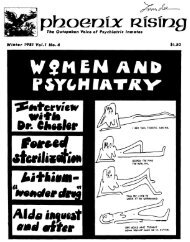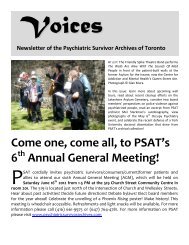Vol. 5, No. 4 - Psychiatric Survivor Archives of Toronto
Vol. 5, No. 4 - Psychiatric Survivor Archives of Toronto
Vol. 5, No. 4 - Psychiatric Survivor Archives of Toronto
You also want an ePaper? Increase the reach of your titles
YUMPU automatically turns print PDFs into web optimized ePapers that Google loves.
that many people don't know about, or don't think about.<br />
That is, ifa person is found legally insane and is put in a<br />
state mental hospital, at some point later they may apply to<br />
be released - that is, restored to sanity. The definition <strong>of</strong><br />
being restored to sanity is when you're no longer<br />
considered dangerous, so the psychiatrist gives us more<br />
phony "expert opinions" about whether the person is<br />
dangerous. The absolute crowning glory to this thing is that<br />
psychiatrists have been screaming at the top <strong>of</strong> their lungs<br />
in front <strong>of</strong> the United States Supreme Court saying, "We<br />
don't know how to tell who's dangerous. Sodon'task usto<br />
tell who's dangerous." The trouble is they say that in only a<br />
few cases; in most cases they are quite willing to go in and<br />
say whether someone's dangerous. So here we have a<br />
situation where a murderer can be out on the street again in<br />
a couple <strong>of</strong> years because psychiatrists say he is no longer<br />
dangerous, and the next guy may bea non-violent<br />
<strong>of</strong>fender, but could be locked up 10,12 or 15 years<br />
because the psychiatrists say he is dangerous. And they're<br />
admitting in other forums that they don't know how to tell<br />
who's dangerous.<br />
We move beyond the insanity defence to what we call<br />
the diminished capacity defence. The person on trial may<br />
not even enter an insanity plea, but psychiatrists can still<br />
come in and testify whether or not the person had a particular<br />
intent; that is, whether the defendant intended to kill<br />
the victim or just to hurt him. The prosecutor has to show<br />
that it was the intention to killbefore he can get a conviction<br />
for murder. If he can't prove that, the person will<br />
only be convicted <strong>of</strong> manslaughter. That whole area is a<br />
much-expanded role for psychiatry in the courtroom.<br />
Besides the criminal area, there's a whole other area <strong>of</strong><br />
what we call personal injury lawsuits. Somebody files a<br />
lawsuit and says, Iwas in this automobile accident or Iwas<br />
at work and such and such happened. <strong>No</strong>w, there's no<br />
question that people can be injured and that there can be<br />
psychological consequences. I'm not trying todeny that.<br />
My point is that psychiatrists have absolutely no way to<br />
know better than the members <strong>of</strong> a jury whether or not a<br />
person was traumatized by a certain set <strong>of</strong> events. What<br />
happens is the psychiatrist goes in and acts as a promoter <strong>of</strong><br />
the person who is filing the lawsuit and merely repeats<br />
whatever they've been told. I see this over and over again.<br />
Then the court hears it as expert testimony. Ido quite a bit<br />
<strong>of</strong> work teaching lawyers how to cross-examine psychiatrists<br />
- to show how empty and useless and unscientific<br />
the evidence really is.<br />
Then there are a whole host <strong>of</strong> other things. Imentioned<br />
child custody. Or people can be prevented from<br />
getting a job because <strong>of</strong> phony psychiatric testimony.<br />
Police departments are also starting to use psychological<br />
testing to supposedly screen out people who are unfit. Ican<br />
tell you that it's not going to work; there's no way we're<br />
going to get better candidates through psychological<br />
testing. Or things having to do with whether you can drive a<br />
car or not - a psychiatrist can give an opinion that may<br />
18 Phoenix Rising<br />
keep you from driving a car. Or the question <strong>of</strong> whether<br />
someone in the military just refuses to follow orders or is<br />
incapable <strong>of</strong> doing it - that may determine whether he<br />
gets money or doesn't get money.<br />
Disability is another big area. This is a very delicate issue.<br />
We have lots <strong>of</strong> ways to spend government money and<br />
we've got to be careful where we spend it. The question is<br />
whether there are certain people who deserve to have<br />
money to help to support themselves because they're not<br />
able to work. Obviously, there are some people who are<br />
disabled and do deserve this. I'm not trying to minimize the<br />
problem. What I'm saying is that we <strong>of</strong>ten turn to psychiatrists<br />
to tell us - Mr. Holy Man, tell us whether or not<br />
the person is unable to work or unwilling to work. This is<br />
nonsense - to think that a psychiatrist has any way to<br />
determine this. These are what Icall hidden agendas,<br />
where we turn to the psychiatrist when we don't want to<br />
face up to these problems. Icould go on. It's a long, long<br />
list. It goes across the board in criminal, civil, and other<br />
matters.<br />
Markman: The Hinckley case and the Dan White case<br />
have focused public attention on the insanity defence, on<br />
diminished capacity and on competency to stand trial.<br />
What do you feel about the reforms proposed? Do you<br />
think they go far enough?<br />
Coleman: <strong>No</strong>, there is no state in the country (US) that is<br />
proposing anything which gets to the heart <strong>of</strong> the matter<br />
with these issues. Let me tell you what I think would get to<br />
the heart <strong>of</strong> the matter. Do not expect the experts to help<br />
us. It's only the ordinary, commonsense people <strong>of</strong> this<br />
country who are going to do it, ifitcanbedone. Here's<br />
what you've got to do with the insanity defence in order to<br />
make real progress. The first thing to do is get psychiatry<br />
out <strong>of</strong> the initial trial. <strong>No</strong>w, that doesn't mean that you take<br />
out <strong>of</strong> the trial the mental issues before the court. There are<br />
legitimate mental questions: what did the person intend?;<br />
did they plan it?; and so on. Butthe behaviour <strong>of</strong> the<br />
person on trial is the best way for the court to decide. So<br />
we've got to get the psychiatrists out in deciding the initial<br />
question. Then we mustface up to the hypocrisy <strong>of</strong> the<br />
insanity defence itself, which no legislators, no experts, are<br />
really confronting. The hypocrisy is this. The theory <strong>of</strong> the<br />
insanity defence says that there are certain people who are
















